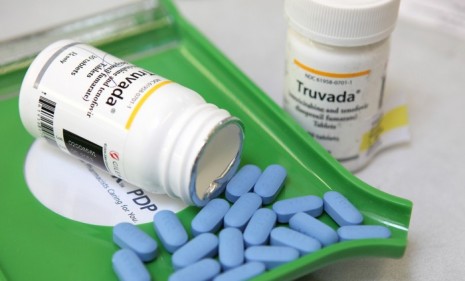Preventing AIDS with a pill?
In what's being called a major breakthrough, researchers have found that a daily dose of antiretrovirals can nearly prevent HIV infection

A free daily email with the biggest news stories of the day – and the best features from TheWeek.com
You are now subscribed
Your newsletter sign-up was successful
There's no vaccine against HIV, but researchers think they have discovered the next best thing: A daily pill that cuts the risk of catching the infection by up to 90 percent. AIDS experts and advocacy groups hailed the results of a three-year study, published in the New England Journal of Medicine, as a major breakthrough in the global fight against the deadly disease. How will it work? And what are the drug's limitations? (Watch an AP report about the study)
What is this magic drug?
Its brand name is Truvada, made by California drugmaker Gilead Sciences. Truvada combines two antiretroviral drugs, emtricitabine and tenofovir disoproxil fumarate, into a single pill, and has been used to treat HIV since 2002. This study is the first to confirm it helps prevent the disease.
The Week
Escape your echo chamber. Get the facts behind the news, plus analysis from multiple perspectives.

Sign up for The Week's Free Newsletters
From our morning news briefing to a weekly Good News Newsletter, get the best of The Week delivered directly to your inbox.
From our morning news briefing to a weekly Good News Newsletter, get the best of The Week delivered directly to your inbox.
What did the study show?
Researchers from U.C. San Francisco's Gladstone Institute gave 2,499 healthy gay or bisexual men in the U.S., Brazil, Peru, Ecuador, South Africa, and Thailand daily doses of either Truvada or a placebo. Among the men who got the placebo, 64 contracted HIV in the study's three years. The Truvada group had 36 HIV infections, but two of those predated the study and in 31 of the 34 others, the men did not have the drug in their blood, suggesting they hadn't taken the pills. Researchers hailed this a 90 percent success rate in staving off HIV.
How conclusive is this study?
There are still plenty of questions hanging over it. It's unclear if the pill will work on women or heterosexual men, although the assumption is that it will. The study also didn't show if other similar drugs have the same preventative properties, whether you could take the drug only when sexually active, or how quickly it starts to work.
A free daily email with the biggest news stories of the day – and the best features from TheWeek.com
Is the drug better than using condoms?
"The results are encouraging, but it's not time for gay men to throw away their condoms," says Dr. Kevin Fenton, head of the federal Center for Disease Control's AIDS division. Instead, at-risk people will be encouraged to use as many prevention techniques as are available. A daily dose of Truvada is also a promising alternative for prostitutes, rape-vulnerable prisoners, drug users, and others for whom condoms are not a viable option.
How much does the drug cost?
In the U.S., Truvada sells for about $1,000 a month. In poorer countries, a generic version sells for closer to $15 a month. American insurers won't cover it for preventative use yet, and public health officials will have to discuss whether it's best to use the drug, available in limited amounts, to treat AIDS patients or to prevent healthy people from getting the disease.
When will the treatment be available?
If you have the money, it is available now. Doctors in the U.S. can legally prescribe Truvada off-label, or for non-recommended purposes. But for the wider population, it will probably be offered as an AIDS-prevention tool in a year or two. "Clearly we need to know more about this therapy," says Dan Van Gorder at Project Inform in San Francisco. But "I think the world is at a real crossroads in terms of its ability to drive this epidemic to an end."
Sources: New York Times, NBC News, San Francisco Chronicle
-
 American universities are losing ground to their foreign counterparts
American universities are losing ground to their foreign counterpartsThe Explainer While Harvard is still near the top, other colleges have slipped
-
 How to navigate dating apps to find ‘the one’
How to navigate dating apps to find ‘the one’The Week Recommends Put an end to endless swiping and make real romantic connections
-
 Elon Musk’s pivot from Mars to the moon
Elon Musk’s pivot from Mars to the moonIn the Spotlight SpaceX shifts focus with IPO approaching